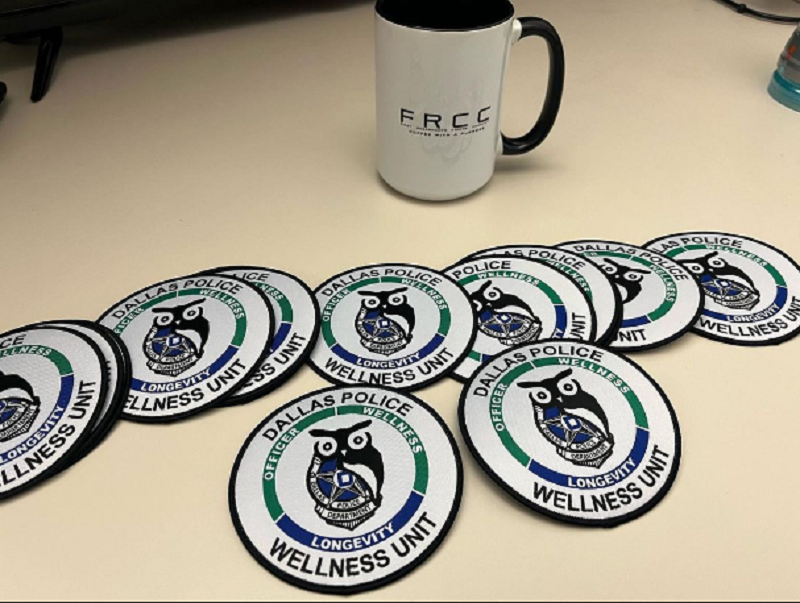
It has long been debated that so much more needs to be done for law enforcement officers burdened by all-seeing psyches and the accompanying stigma bottling it all within. Many among us repeat the mantra “We have to do better!” for our courageous cops who pack macabre realities deep down. Some police agencies are doing better…
The Dallas Police Department created the OWL Unit —Officer Wellness Longevity— in the latter quarter of 2022. Let’s hope it is contagious. It must permeate policing once and for all.
I came across a checkmark in the Wins column tallying cops saved by pillars among us, posted by our friends at The Officer Next Door. With their permission, here is what they published:
“It can happen to anyone. No matter how much they seem to ‘have it together’.
“They say when police need help, they call SWAT.
“Who does SWAT call when they need help? Well, that depends on the issue at hand. Even the strongest among us need help at some point, the question becomes, are you able to ask for it?
“The Dallas Police Department under the leadership of Chief Eddie Garcia, is leading the way in offering officers the ability to get help and treatment for issues they may be facing with no fear of repercussions. Struggles with mental health and alcohol abuse being the most common. A truly groundbreaking program that has without question, already saved lives.
“When Sgt. Taylor looked in the mirror and realized he needed help, he sent an email saying so. The Dallas Police Department’s newly formed OWL Unit stepped up and provided that help.
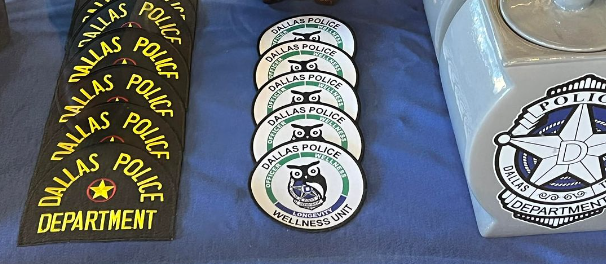
(Photo courtesy of the Assist the Officer Foundation.)
“In this episode, you will hear how Sgt. Taylor was concerned about how others would react when they found out he needed the help he did. Likely a common fear among many in the same situation. The reaction was nothing but support and encouragement from his fellow SWAT members and the department as a whole. No punishment, judgment, or career limitations.
“If you’re struggling and you’re a member of the Dallas Police Department – reach out to the OWL Unit and take the help you’re being offered. There’s no shame, only respect for someone brave enough to admit, they don’t like what they currently see in the mirror and are willing to change it.”
I immersed my mind in a podcast I found on the Assist the Officer (ATO) Foundation website, titled, “The Story of the Dallas Police Wellness Unit, The Owl” encompassing the dynamics of support and encouragement for colleagues bearing burdens, to receive counsel from clinicians and peers (“checkpoint officers”).
I had the honor of corresponding with Dallas police Officer Joe King, who is an anchor in the OWL unit; he speaks and shares insights in the following brief video:
Among the rightly placed professionals comprising the Dallas Police OWL Unit’s counselors is law enforcement psychologist Dr. Heather Twedell who, in late 2022, said, “The police profession is like a bad human experiment as we expect a human being to sit and watch bad vision after bad vision and terrible experience after terrible experience for decades and expect them to be normal in their own lives and have healthy relationships.”
Doctor Twedell’s words garner zero debate!
Grassroots Wellness Roundtable
It is not only the law enforcement agencies shaping officer-wellness programs for longevity. Some grassroots-like conduits are sprouting also. One example is the Ride Along Chronicles Podcast launched by “[three] great friends who raised […] families in the first responder lifestyle for over 20 years. Without realizing it, we ended up creating our own support system because the struggles of police families haven’t changed.
“We hope to bring those challenges to light by allowing our confidential guests to share what didn’t exist for us, a safe space to feel supported instead of alone. Our guests will openly share their journeys without identifying themselves, their first responder, or agency. Our goal is to share lessons learned and provide helpful tools to keep Law Enforcement Officers (LEOs) and their families in the front seat.”
The ladies behind the Ride Along Chronicles Podcast mics convey some behavioral traits and signs of cops who may be on the ropes, tacitly telegraphing an S.O.S. The Podcast discusses the onslaught of first responder stressors and the proverbial “stigma” associated with speaking up about the thousand tiny battles equating to a thousand tiny cuts (at the very least), hoping to salve the hemorrhage before we add another statistical scar.
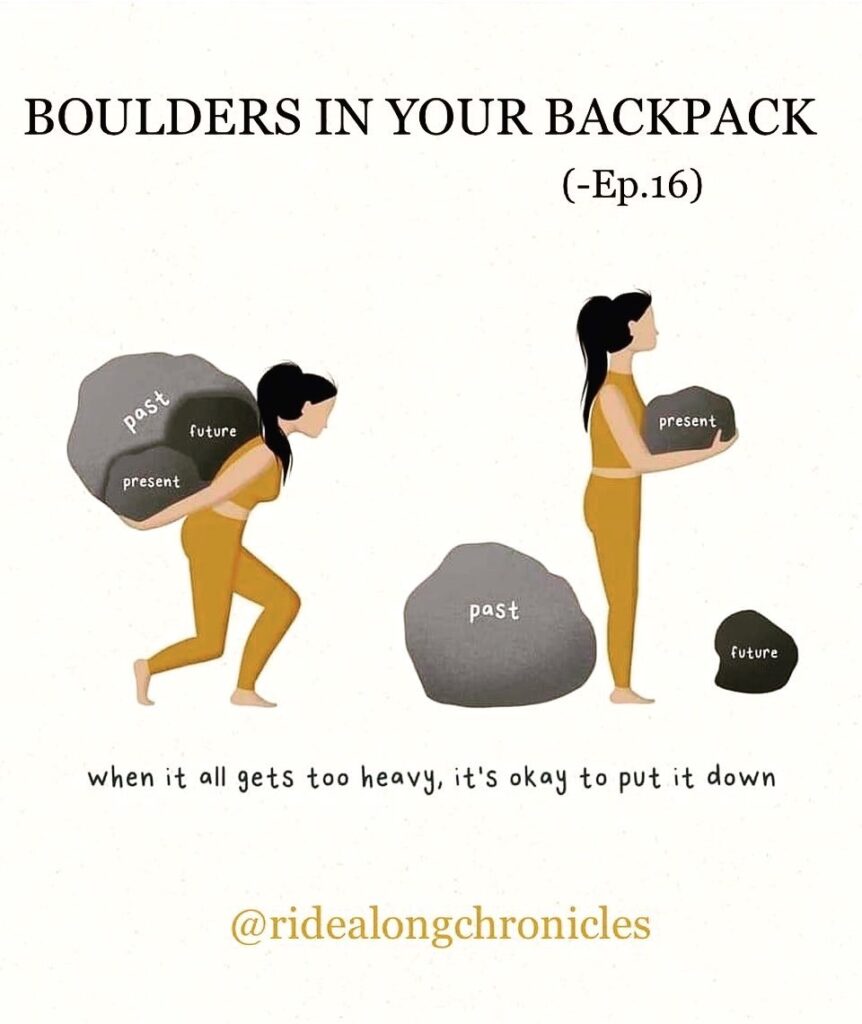
(Image provided courtesy of the Ride Along Chronicles Podcast.)
Accompanying that graphic message were the following words from the Ride Along Chronicles Podcast:
“When a traumatic incident weighs heavy, how do you unload it and who can help?
“…Courtney shares how the aftermath of her LEO’s critical incident and subsequent medical retirement ended up feeling like he was carrying boulders in his backpack. Courtney had a front-row seat on that journey and explains why it’s so important to never give up and never let your LEO’s isolation become his best friend.”
Soaring Stats and Emotional Sway
Cop or not, it is difficult to not let emotions occupy the wheelhouse of What could I have done? My own experience as a cop who lost a colleague to self-destruction still harbors introspection, chronically questioning the haunting reality that I may have missed clues before a beloved life was eternally lost.
Ernest Hemingway said, “When people talk, listen completely. Don’t be thinking about what you’re going to say. Most people never listen. Nor do they observe.” I listened. I observed. He took his life roughly two weeks later. I failed a first responder.
Thankfully, more police organizations are piecing together wellness-based programs to help stave off further losses of pent-up cops who carry crosses.
From our friends at 5-0 Mental Health (5-0 is another street moniker referring to cops): “As first responders, we are all experiencing tragic daily chaos that is not discussed. Rather than being seen as painful or traumatic, it becomes normalized.”
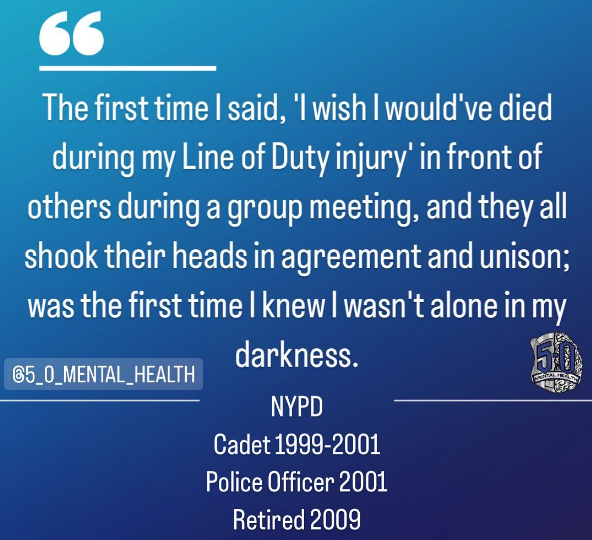
America has far fewer law enforcement officers nowadays, thanks to the asinine politics breathing life into anti-police lungs while the nation’s peacekeepers engage misplaced malice and hatred and voluminous violence—plenty to scorch the psyche of police officers anywhere.
Indeed, A thousand tiny cuts. By the day? By the hour? In just one surreally awful call? Thousands of police calls-for-service mount in the Inexplicable column.
Yes, cops are strong and brave. Yes, LEOs are trained to defend. Yet, we dry-swallow when we read about another cop who clung to the cliff until they consciously unloosed their hold.
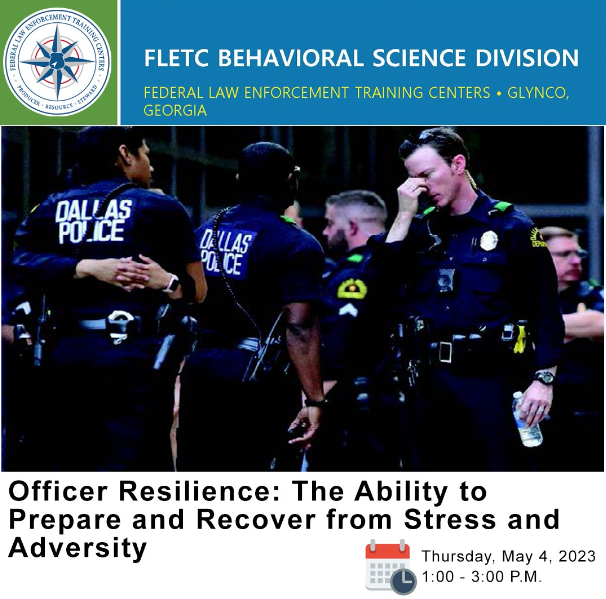
Indeed, humans are resilient and resourceful and resoundingly chock full of hope. However, police work is an animal rife with nature’s worst elements of destruction, caked on by the daily tour of duty.
It is beyond high time that we cater to whatever cops need, without question.
We shouldn’t be surprised that our country’s cops find themselves in corners of darkness, maintaining meekness about the internal battles born of a multitude of hellacious experiences. Whereas cops perform humanitarian deeds daily, so much petulance and rancor and uproarious anti-police behavior de-valuing cops and de-basing the brave souls who swore allegiance to public safety…boggles the mind. Sadly, the tsunami of unrelenting barbarism significantly bears down on our country’s cops.
Law and order are reduced to caricatures while cops nevertheless go out there and place themselves in the cauldron of public exposure, some murdered at plotted ambushes, like the Dallas 5 who were felled on July 7, 2016. (The podcast linked above avails details directly from those who were involved in that macabre incident and how the Dallas police force handled the weighty affront.)
We should be investing Ukraine-like funding in law enforcement officer wellness and longevity.
Respectfully scrutinizing the longevity connotationemployed in the Dallas Police OWL unit, I came upon a correlate written by a representative of Assist The Officer, Bridging the Divide:
“This profession is a never-ending story of tragedy, violence, understaffing, and, in some cases, underappreciation for the women and men that show up daily to serve their citizens.
“Dallas PD, with its long history of traumatic events, carries the scars from decades of these events and the daily grind of putting on that uniform and their iconic Dallas Police badge. A robust, all-hands-on-deck proactive approach is long overdue to help our profession normalize the conversation on mental health and overall fitness, so our officers understand, and, more importantly, feel they have support to know it’s ok to NOT be ok.”
In closing, April is Stress Awareness Month. For cops, it is every day of every month…the constancy cramming even bigger boulders in their public safety saddles. However, I’m eager to see the OWL Unit’s Wins column get super-crowded with high marks!
Dallas police Officer King shared with the NPA that since the OWL Unit’s inception, “We’ve reached out to over 1000 officers after they’ve responded to potentially harmful-type calls, and we are [seeing] around 9-11% of them actually asking for resources and counselors from us.” And the OWL Unit initiative is in its infancy, garnering traction and focused on deserved salvation of crimefighters.
“We continue to identify data and track it,” Officer King added. And sharing their scope and successes is yet another nugget the OWL Unit has to offer, namely with other law enforcement agencies.
“We’ve had Border Patrol reach out. Wichita Kansas PD. Marshall Texas PD. Cedar Rapids Iowa PD. San Antonio PD…there is a growing list of other agencies interested in our work,” King shared.
As Dallas police Assistant Chief Reuben Ramirez said, “What we needed to build was something that was incredibly proactive and forward-thinking, something that reached our officers before they were in a crisis. And it needed to be in a manner that our officers would relate to…
“The Dallas Police Department might be the most unique police department in the United States of America as it relates to the need for a full-throttle, bell-and-whistle, robust wellness unit.”
As Dallas police Sergeant Omar Figueroa coined, “Stop The Ill-Gained Mental Attitudes” (STIGMA). Sgt. Figueroa survived the ambush murders of five Dallas cops in July 2016; you can hear his account at 51:30 in the ATO podcast.)
For all his personal/professional efforts in helping construct the OWL unit and overseeing its growth and success stories, Officer King intimated:
“I’ve had people from across the country reach out, civilians and first responders with feedback over our podcast. It’s been very rewarding to hear that it’s helped people in various situations and different ways. I’ve made some friends in other states. Motivates me to do more.”
Spoken like a true-blue cop’s cop, motivated to do more…like bridging the divide over the gulf of burdened cops.